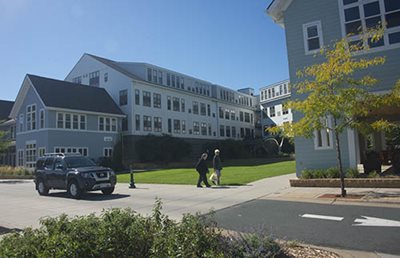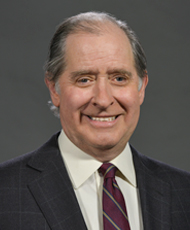Livable Communities Act supports local solutions
September 2022
 A mixed-use development with housing, commercial, and public space on the shores of White Bear Lake. A thriving industrial park in Fridley. A shelter with supportive services for homeless Native American youth in Saint Paul.
A mixed-use development with housing, commercial, and public space on the shores of White Bear Lake. A thriving industrial park in Fridley. A shelter with supportive services for homeless Native American youth in Saint Paul.
These are among hundreds of redevelopment projects that the Metropolitan Council has supported with Livable Communities Act grants over the last quarter century. This program, enacted by the Minnesota Legislature in 1995, helps cities and townships achieve development goals that create more housing choice, support living wage job creation, and connect jobs, housing, and regional amenities to create a more equitable region.
In the 27 years since it was signed into law, the Met Council has given more than 1,200 Livable Communities Act grants, investing more than $450 million in our region. That seed money has helped leverage billions in private and other public investments.
Local governments apply for the grants, which are used to clean up polluted sites, make way for new development, build and rehabilitate affordable homes, and develop housing and businesses along transit lines. Ultimately, these grants promote innovative solutions to the creation of housing, jobs, and services while demonstrating efficient and cost-effective use of land and infrastructure.
While the majority of the grant money has been spent on cleaning up polluted land and helping rehabilitate or build new housing and commercial development, we also spend a small portion helping communities do predevelopment work and create policy to carry out their comprehensive plans. The most recent of these awards, in September, focus on sustainability, innovation, and equity.
 For example, the Met Council awarded $125,000 to Brooklyn Center to support expansion of the Center for Asian and Pacific Islanders. We invested $44,000 to help Mahtomedi implement the city’s Sustainability Plan to reduce energy use, vehicle miles traveled, and the amount of waste generated. And in Minneapolis, we granted $60,000 to support construction of affordable townhomes designed to reduce energy use.
For example, the Met Council awarded $125,000 to Brooklyn Center to support expansion of the Center for Asian and Pacific Islanders. We invested $44,000 to help Mahtomedi implement the city’s Sustainability Plan to reduce energy use, vehicle miles traveled, and the amount of waste generated. And in Minneapolis, we granted $60,000 to support construction of affordable townhomes designed to reduce energy use.
Without funding from the Livable Communities program, these projects might not get off the ground.
From rebuilding Lake Street after the civil unrest in the wake of the murder of George Floyd, to helping cities plan to fight climate change, to cleaning up polluted sites to build new housing and development, the Livable Communities Act program has helped people at the local level tackle big challenges and develop solutions.
Supreme Court Justice Louis Brandeis is famous for saying that the states are the laboratories of democracy. Over the years, we’ve seen that the Livable Communities Act is helping communities be laboratories for our region’s success.
– Chair Charlie Zelle